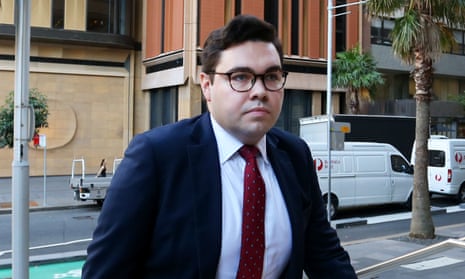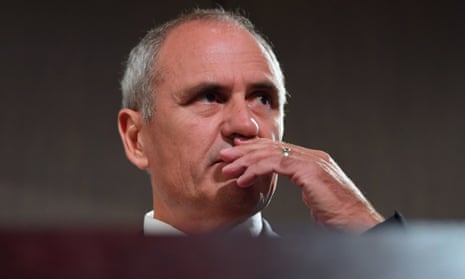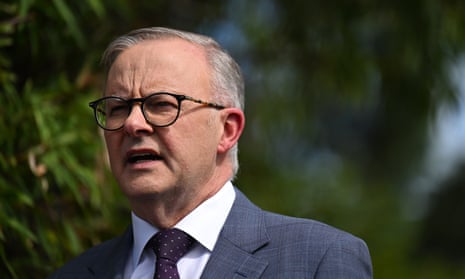Anthony Albanese says China relationship is improving
The prime minister tells reporters “the relationship with China is improving and that’s a good thing”:
We are about building investing in our capacity, but we are also about investing in our relationships.
I had a very successful meeting with President Xi [Jinping]. Our foreign minister visited China at the end of last year to commemorate the 50th anniversary of relations between Australia and the People’s Republic of China.
I look forward to engaging China. We will cooperate where we can, we will disagree where we must, and we will engage in our national interest.
Australia has had a turbulent relationship in the past few years with China, its largest trading partner.
At the height of diplomatic tensions between China and Australia in 2020, Beijing blocked phone calls and meetings between Australian government ministers and their direct counterparts in the wake of the Morrison government’s early push for a Covid origins inquiry.
The Morrison government accused Beijing of engaging in “economic coercion” by rolling out tariffs or unofficial bans on a range of Australian exports, including wine, barley, red meat, lobsters and coal.
The Albanese government maintains that it has not given ground on Australia’s national interests or policy positions, but it has pursued a deliberate effort to engage in dialogue to try to get the relationship on a better footing.
For more context on the relationship between Australia and China, read my colleague Daniel Hurst:
Key events
Ancient eagle named Australia’s largest-ever bird of prey
More breaking animal news in: an eagle with talons large enough to grab a kangaroo has been confirmed as Australia’s largest-ever bird of prey, AAP reports.
Fossil hunters from Flinders University have pieced together the eagle’s story, and named it Dynatoaetus gaffae. Fossil remains in South Australia’s Mairs Cave connected to bones previously found in Naracoorte Caves, Wellington Caves and near the Lake Eyre Basin.
The eagle had a three-metre wingspan and 30cm talons, making it twice the size of a modern-day species.
Closely related to the old-world vultures of Africa and Asia, it is now known to be the top avian predator in the late Pleistocene period.
Palaeontology researcher Ellen Mather said:
We were very excited to find many more bones from much of the skeleton to create a better picture and description of these magnificent, long-lost, giant extinct birds.
It’s often been noted how few large land predators Australia had back then, so Dynatoaetus helps fill that gap.
Blue-ringed octopus bites woman at Sydney beach
A potentially deadly blue-ringed octopus has bitten a woman in her 30s in Sydney’s north shore, AAP reports.
Paramedics were called to Chinamans Beach at 2.45pm today and the woman was taken to Royal North Shore hospital for treatment.
The name “blue-ringed” comes from iridescent blue markings that glow on the octopus’ skin when threatened. They produce a toxin that causes paralysis and can be fatal.
Although a bitten person will stay conscious, the octopus’ toxins paralyse muscles such as in the respiratory system – meaning some victims can die from a lack of oxygen. If a victim of a bite is given air manually, they will generally make a full recovery.
At least two Australians have died from a blue-ringed octopus bite, according to the Australian Institute of Marine Science.
The octopus is native to much of the Australian coastline, but only attacks when provoked.

Christopher Knaus
Lehrmann grilled over delay in launching defamation case
Bruce Lehrmann has just been cross-examined by Sue Chrysanthou SC, representing Lisa Wilkinson, on the reasons he delayed bringing a defamation claim against her client, as well as Network Ten, News Corp and Samantha Maiden.
Lehrmann is arguing he had delayed bringing the claim because of prior legal advice, which told him not to launch defamation proceedings, and due to the prospect of a criminal trial.
Chrysanthou put it to Lehrmann that he had wanted to sue Wilkinson from the night her interview with Brittany Higgins aired on 15 February 2021 and had formed the view from 18 June 2021 that there would soon be a resolution to clear the criminal allegations against him.
Lehrmann agreed.

Chryanthou said:
You were acutely aware … that you were in a position to sue for defamation?
Lehrmann responded:
I reject that I was in a position to sue for defamation.
The court also heard Lehrmann kept a “blue book”, in which he noted what he had seen in the media and planned his fightback against news outlets.
He listed friendly journalists – including Andrew Clennell and Andrew Bolt, of Sky News – who may be willing to share his version of events, the court heard.

Amy Remeikis
Treasurer pours cold water on tax overhaul call
Still on Jim Chalmers and the treasurer was asked to respond to former treasury secretary Dr Ken Henry’s assertion that Australia’s tax system needs an overhaul.
The Howard government handed out a lot of treats in the form of tax concessions and tax breaks for people, particularly higher income earners, and trying to reform that system is like, well, taking candy from a baby – loud and uncomfortable.
Henry told the Taxation Institute of Australia (as reported by the AFR) that “the interests of the most disadvantaged are not being served by a tax system that is punishing innovation, denying people opportunity, undermining economic growth and denying the sustainability of government service provision”.
Moreover, there can be no ignoring the extraordinary intergenerational inequity inherent in our present tax system.
And that meant, as Henry and other economists who have turned a serious mind to this have found, that the young are being burdened with having to pay a debt that hasn’t particularly benefited them, while being weighed down with their own debt, including for education – and unable to break into the housing market.
It’s a recipe for disaster.

So, will Chalmers look at reform anytime soon?
Chalmers:
I think for all of you that observed some of the frankly hyperventilating about what was a very modest change to superannuation tax concessions would understand, as they do, that tax reform is difficult in this country.
So, in my view, make your priority known – in our case multinational taxes, we were working very closely with friends around the world on multinational tax. We have a proposal out there on superannuation tax concessions which allow for the concessions to still be allowable to everyone but slightly less generous for people who are in that top 0.5% of superannuation balances – some pretty modest change, a meaningful one when it comes to the structure of the budget.
I think inevitably every budget, whether it is a Labor government or a budget handed down by the other side of politics, needs to contemplate some combination of three things: spending restraints, which we were able to show in October; trimming spending where that spending is not especially productive, where we are not getting value for money; and modest, meaningful tax reform in areas like super and multinational taxes. That is the approach we have taken.
Ken is in favour and on the record multiple times over a long period of time for something more comprehensive. We’ve got a different set of priorities when it comes to that.
So that’s a no then.

Amy Remeikis
Hello from Canberra on this warm afternoon – I hope everyone is staying hydrated!
You may have seen Josh Butler’s report this morning on Jim Chalmers’ speech to Ceda. Chalmers was previewing the Productivity Commission’s five-yearly report, which is due to be released tomorrow – and the short version? Things are not great.
You can read Josh’s take here:
But without some major change, then we will be even further behind than we are, when it comes to boosting productivity. And that’s not the fault of workers, but the system.
The report’s not yet out but Chalmers has been doing what they call in the business “managing expectations”. Which means laying out the bad news ahead of time.
Australia can’t afford not to be in Aukus deal – PM
On Aukus’ anticipated $10bn annual cost over three decades, Anthony Albanese says Australia cannot afford to “not do it”:
The question here is, can we afford to not do it? And the answer to that is no. We need to give ourselves the best capability.
It is like if you go for an inferior product, you don’t want buyer’s remorse. What you want to do is to make sure that we increase the capability of our defence force.
Asked about whether the government will need to cut in spending, or raise taxes to afford Aukus, Albanese says recent changes to superannuation will go towards the budget.
We understand that there are real fiscal pressures. One of those is defence, another is the NDIS, another is Medicare and health with the ageing of the population. Another is the increased interest payments … Governments are going to have to make difficult decisions. And we have shown with this that we are prepared to make a difficult decision. We have shown with the superannuation decision that we made that we are prepared to make a difficult decision.
We are having the open conversation about the costs of this policy. But as I said, it is when you actually take a step back and look at this – under 10% of the defence budget, and it produces a quantum leap in the capacity of the defence force, and then I think that it is the right thing to do. It is an investment in our security. And nothing is more important than looking after our national security. That’s a precondition for a successful economy.

Aukus deal will have ‘massive spinoff’ – PM
More from the prime minister on 2GB – Albanese says Aukus “ticks all the boxes”.
This is not just a defence policy. This is about Australian sovereignty and our manufacturing capacity.
What this will do is have a massive spinoff because this is the most highly sophisticated machinery that you can think of – a nuclear powered submarine. So there will be not just 20,000 direct jobs created in Australia, there will be many more indirect jobs. And so it’s about our economy. It’s about our national sovereignty. It’s about defence. And it ticks all the boxes.
‘We have done the right thing’ – PM
On 2GB Anthony Albanese assures that the Aukus engagement is “the right decision for Australia”.
I take my responsibility very seriously indeed, to listen to Defence and national security experts to determine what is the best way to keep Australians safe. And the best way to keep Australians safe is to invest in improving our capability, but also invest in our relationships.
This is a long-term investment with our traditional friends and allies, the United States and the United Kingdom, and it is the right thing to do. I’m very confident that we have done the right thing.
PM says his government has turned international perceptions of Australia around
Anthony Albanese moves away from Paul Keating’s criticism of Aukus by pointing to Australia’s improved international relationships since coming to office in 2022:
In that year, what we have done is turn around the way that Australia is perceived in the international community. We are a trusted partner. We want to trade with our friends. We want to trade in the region.
That is why I spent time in India as a guest to prime minister [Narendra] Modi … That is why I called in on Fiji and spoke to the newly elected prime minister there just yesterday …
That is why I’ve engaged … in the Indo-Pacific. Australia is back in the international community around the table.
Of course, the entry fee for credibility is action on climate change. And that is why my government’s position on climate change has been so important in transforming the relationship we have with Indo-Pacific neighbours.
‘This debate about sovereignty is absurd’: Albanese
Anthony Albanese tells reporters in Aston concerns around Australia’s sovereignty as he joins the US and Britain in Aukus nuclear submarine agreements is “absurd”:
Australian sovereignty is a short full stop, exclamation mark. That is what happens. This debate about sovereignty is absurd.
… We will determine our sovereignty with all our assets. And that is very clear.
Albanese says he respects views of former parliamentarians, but assures there has been no disagreement around Aukus in his team:
There is no disagreement amongst anyone who has received any of the national security briefings in my team … This overwhelmingly has received support when the announcement was made originally about Aukus.
Anthony Albanese says China relationship is improving
The prime minister tells reporters “the relationship with China is improving and that’s a good thing”:
We are about building investing in our capacity, but we are also about investing in our relationships.
I had a very successful meeting with President Xi [Jinping]. Our foreign minister visited China at the end of last year to commemorate the 50th anniversary of relations between Australia and the People’s Republic of China.
I look forward to engaging China. We will cooperate where we can, we will disagree where we must, and we will engage in our national interest.
Australia has had a turbulent relationship in the past few years with China, its largest trading partner.
At the height of diplomatic tensions between China and Australia in 2020, Beijing blocked phone calls and meetings between Australian government ministers and their direct counterparts in the wake of the Morrison government’s early push for a Covid origins inquiry.
The Morrison government accused Beijing of engaging in “economic coercion” by rolling out tariffs or unofficial bans on a range of Australian exports, including wine, barley, red meat, lobsters and coal.
The Albanese government maintains that it has not given ground on Australia’s national interests or policy positions, but it has pursued a deliberate effort to engage in dialogue to try to get the relationship on a better footing.
For more context on the relationship between Australia and China, read my colleague Daniel Hurst:
‘I have no intention of engaging in a public argument with Paul Keating’: PM
The prime minister, Anthony Albanese, has joined a press conference with Mary Doyle, the Labor candidate for Aston, an electorate in Victoria with a big Chinese community. Albanese answers a question about the former Labor prime minister Paul Keating’s criticism of Labor’s Aukus involvement by saying he has “no intention of engaging in a public argument” with Keating.
Paul Keating is a big guy. He is entitled to his opinion.
I think on those issues he is wrong; I’m acting in the national interests. I’m acting in the national interest by investing in Australia’s capability, but I’m also investing in our relationships …
He has my respect and I have no intention of engaging in a public argument with Paul Keating … We praise our heroes for the contributions that they’ve made, but my responsibility in 2023 is to give Australia the leadership that they need now, not what they might have needed in the 1990s.
Protests should not ‘inconvenience people’, Perrottet says after climate protester’s jail term overturned
The NSW premier, Dominic Perrottet, says there is no place for disruptive climate change protests after climate protester Violet Coco’s imprisonment was appealed yesterday.
Perrottet said he wasn’t aware of the court’s decision until questioned today, AAP reports. He told reporters:
I’ll make this point – there’s no place in our state for that type of behaviour.
If you want to protest in NSW, you’re free to protest. But when you protest, you do not inconvenience people across NSW.
That’s exactly what occurred in that situation.
A 15-month jail sentence was imposed on Coco for blocking a lane on the Sydney Harbour Bridge with a truck amid morning traffic in April last year. Yesterday she was placed on a 12-month good-behaviour bond after a district court judge Mark Williams overturned the jail term.
Williams noted that she had been initially imprisoned on false information provided by the NSW police.
Coco was one of the first people charged after the NSW parliament introduced greater penalties and reach of laws targeting those who block traffic on major routes.

Rafqa Touma
Thanks to Natasha May for feeding the blog through the day! I’ll be taking it into the evening.
Chalmers says 3.5% unemployment rate a ‘pleasing result’
The treasurer, Jim Chalmers, has also responded to the jobs figures released today saying the fact more Australians are in work and the unemployment rate is around historic lows is a “pleasing result”.
Since the Albanese government came to office, 278,000 jobs have been created.
We’ve got a lot coming at us but we’ve got a lot going for us, including unemployment at 3.5%.
A slowing global economy and higher interest rates will inevitably impact our own economy and labour market.
We expect employment growth to moderate over coming months on the trajectory we outlined in the budget.

Christopher Knaus
Lehrmann tells court text about potential to receive ‘millions’ in defamation claim was a fabrication
Bruce Lehrmann is being cross-examined about the vast delay in bringing his defamation claim against News Corp, Network Ten, and two journalists over their coverage of Brittany Higgins’ allegations.
Lehrmann has said that his legal advice immediately after the publications was that he should not pursue defamation action, and instead wait for the resolution of any criminal trial. He blames the delay, partly, on that legal advice and wants the usual 12-month time limit on defamation claims extended.
But text messages show that on the day of the initial publications, 15 February 2021, while Lehrmann was in the office of his then lawyer Warwick Korn, he was texting his then girlfriend about the potential to receive “millions” in a defamation claim.
He said in the text:
If I’m named tonight, he says I’m up for millions as defamation.
Lehrmann today said that text had been a fabrication. He said Korn had never told him that.
He said he was fabricating the conversation with Korn to placate his girlfriend.
Lehrmann has also blamed the delay in bringing a defamation claim on the prospect of criminal proceedings.
But the court has heard that Lehrmann, also on 15 February 2021, texted his then girlfriend suggesting he had been advised the matter would never get before a criminal court.
Lehrmann said on Thursday that that text was also a fabrication. Lehrmann denied that Korn had given him any such advice.
Dr Matt Collins KC, representing Network Ten, responded:
Your evidence is that you fabricated a conversation with Mr Korn for the purpose of conveying it to [your then girlfriend]?
Lehrmann agreed he had fabricated the conversation.
Rome was burning and I was trying to put on a brave face.
Collins asked:
So you made up a conversation with a lawyer?
Lehrmann said:
Yes.
The court also heard he had called a friend from lobbyist firm Barton Deakin on the same day, seeking a reference for a lawyer. That call took place after he had already organised to meet Korn, a criminal lawyer.
Lehrmann denied that he was asking his friend for a referral for a defamation lawyer. He said he was seeking a recommendation for a second criminal lawyer.
But the court heard the friend later sent him a text saying that she bet the lawyer she had recommended was grateful.
Lehrmann responded:
You have no idea.
Lehrmann told the court there was no second lawyer.
Collins said:
You fabricated conversations with a non-existent lawyer?
Lehrmann said:
Yes
Lehrmann denied raping Higgins in the office of their then boss, Linda Reynolds, and pleaded not guilty. His first trial was aborted due to juror misconduct and a retrial was discontinued due to fears for Higgins’ mental health.
The temperature is rising in Sydney, with the CBD hitting over 35C as of 2.40pm, and even higher in western Sydney where Penrith has hit 37C.
According to the bureau of meteorology the hot air is being dragged over eastern Australia from heat building inland.
The hot, dry and windy conditions are also bringing elevated fire danger, especially in Western NSW.
A high-pressure system is causing heat to build over inland Australia.
The hot air is now being dragged over eastern Australia.
Elevated fire dangers are expected due to hot, dry and windy conditions.
Latest: https://t.co/4W35o8i7wJ pic.twitter.com/NwZXCGtV98
— Bureau of Meteorology, Australia (@BOM_au) March 16, 2023
Chalmers says ‘expanded research agenda’ can produce productivity commission suited to the times
As Chalmers flagged in his essay in the Monthly (which Dutton continues to lampoon for its length as recently as his press conference today), the treasurer wants to see the productivity commission itself improved and made more relevant for contemporary challenges.
Chalmers says an expanded research agenda should be essential in this reform:
To elevate the economic reform discussion, we need to ensure we’ve got a productivity commission suited to the times.
This could mean a more strategic focus on how we maximise opportunities in areas of economic transformation, including the shift to net zero. It could mean building a better understanding of how we measure productivity and the magnitude of the challenge.
What it must mean, is the evolution of a more meaningful, expanded research agenda and a stronger reform blueprint. This is something I’m giving further thought to, and will have more to say about, later in the year.
We all want to turn headwinds into tailwinds. We all want better living standards. We all recognise the central role of productivity growth in that effort.
How we go about it is contested, as it should be when so much is at stake. That’s why so much of our government’s time and effort has been spent building a serious reform agenda here – one that can pair better productivity with a full employment economy that offers more opportunities, to more people, in more parts of the country.
Chalmers ends on the note that improving productivity is not only the government’s task but a collective one which involves business, investors, all levels of government, workers and their unions, “pulling together in meaningful ways on multiple fronts to move further and faster towards our destination and collective mission”:
Improved living standards for our people, decent incomes – and a better, more secure and productive future, built together.
Government implementing two thirds of productivity commission’s reform directives
Chalmers says “Obviously, no government is expected to pick up and run with every recommendation of the productivity commission,” calling out the previous Coalition government for implementing “precisely zero” recommendations from the last five yearly review.
He says the Albanese government is working on more than two-thirds of the 29 reform directives outlined in the report and is “methodically” considering the specific recommendations.
Thirty-six lie at least in part with the states – and I’ll be discussing these with my counterparts at our next meeting in June.
We already have a really comprehensive reform agenda to grow our economy and lift living standards by investing the right way in productivity growth.
(Chalmers gives a whole lot of examples but I will spare you the entire list.)
Chalmers highlights there are more ways than one to satisfy the objectives in the productivity report.
We don’t believe productivity gains come from scorched earth industrial relations, for example, or from abolishing clean energy programs.
Instead, we’ll get productivity gains from investing in our people and their abilities, from fixing our energy markets, from making it easier to adapt and adopt technology so it works for us, not against us – and by creating the stability and certainty necessary for capital to flow towards areas where we have advantages and opportunities to underpin a more modern industrial base.
We want to maximise opportunities in energy, not just minimise costs. We want more cooperative workplaces, not more insecurity and conflict. But I hope these points of difference don’t dominate the coverage, especially when there is so much common ground to be recognised and progress to be made.
